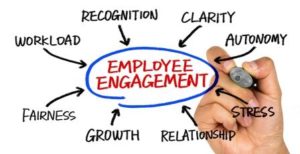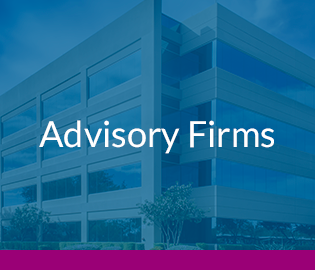
Why should financial advisory firms care about employee and team engagement?
According to Gallup, in the State of Employee Engagement 2018 Study, companies with engaged teams have dramatically higher job retention rates and lower absenteeism, higher productivity, and greater profitability.
For advisory firms whose business model is built on client retention, your team is what drives your value proposition. Since the average headcount of most firms is six employees, this means that even if one employee is not fully engaged or decides to quit, a huge burden will be placed on other members of the team.
How can advisory firms monitor engagement?
Begin by making sure that all employees, advisors and support staff alike:
- Ask questions during meetings and show up to work on time every day.
- Meet their deadlines.
- Spend half the day at their desks and half the day communicating with co-workers.
- Frequently share exciting new ideas with their supervisors.
- Request opportunities for personal development.
- Always ask what else they can do to improve the company.
Don’t panic if not all of your team members exhibit these qualities. There are things you can do to create an environment that encourages and rewards employees to become authentically engaged and do their best work.
Embrace a more compassionate leadership style.
People don’t quit their jobs, they quit their bosses. An inspiring manager creates more team engagement and this can lead to higher employee retention.
According to research done by leadership development experts, Dr. Brad Shuck and Maryanne Honeycutt-Elliott, “higher levels of engagement come from employees who work for a compassionate leader — one who is authentic, present, has a sense of dignity, holds others accountable, leads with integrity and shows empathy.”
Think about treating each member of your team with the same compassion and kindness you provide to your clients. As the leader of the firm, hold yourself to this high standard and recruit and make sure your managers are compassionate and authentic leaders.
Emphasize work-life balance.
Work-life balance often seems like an impossible struggle for all of us. I am writing this column from my dining room table at 10:00 pm on a Sunday evening. It’s difficult to strike that balance between our work and personal life where both feel totally nurtured and satisfied.
Creating a work environment and culture that inspires and supports work-life balance is one of the most important things that your firm can do to help employees not only stay healthy and fit, but keep them engaged every day.
How can advisory firms do that?
Provide work from home options and flexible hours where employees with children or elder care responsibilities are allowed the freedom to balance their work and personal lives to the fullest, but still get their work done.
Work-life balance is going to mean something different for each staff member, so speak with your team to see what you can be doing better as an organization to enhance it. A flexible work schedule is often the easiest way to help people feel more balanced between work and leisure.
The keys to success with workplace flexibility is having trust in your employees and creating standardized workflow procedures to ensure work is getting completed accurately and that deadlines are met. Focus on the quality of your employees’ work results rather than number of hours worked. Have documented goals and objectives for each staffer and provide ongoing feedback.
Acknowledge your team members and show gratitude.
Team members don’t automatically become engaged when you give them more praise; however, employees can quickly become disengaged if they feel like they’re invisible. According to Gallup, employees who aren’t recognized at work are twice as likely to quit. Saying “Hello,” “Have a good night,” or “Thank You” can go a long way.
When an employee puts in extra effort, recognize their actions. Millennials, for example, appreciate feedback and have a desire to learn and grow. Don’t wait until performance review time to acknowledge people. Make your team members feel special on their birthdays, work anniversaries, first day of work, and life events.
Even better, consider random acts of appreciation. One of my advisory clients surprised an employee with a BBQ as a housewarming gift from the team. Another client threw a baby shower for a pregnant team member and surprised her by including her husband in the celebration.
Other firms I’ve worked with acknowledge employees with gift cards, 15-minute in-office chair massages, assorted ice cream sundaes, and a yoga or meditation room where employee can take a quick break to relax and reinvigorate. Acts of gratitude and kindness send the message that you appreciate your employees and are grateful for everyone’s hard work.
Provide more employee feedback more often.
The vast majority of employees I speak to receive little or no feedback on a regular basis. I highly recommend performance check-ins at least quarterly if not more frequently. It’s an opportunity to check-in on progress and ensures team members get feedback and a chance to course-correct before the end-of-year review. The level of formality with these check-in meetings can vary from a simple conversation to having the employee provide a written self-assessment.
This may sound like more work, but more-frequent check-ins with staff members actually saves time. It can take several weeks to do an annual performance review. Additionally, frequent and regular check-ins makes feedback more relevant to the employee and less burdensome to the manager.
At some firms, partners and managers buddy up with team members and have regularly scheduled breakfasts or lunches with no formal agenda. It’s an opportunity to discuss whatever is on the employee’s mind.
Focus on development in the workplace.
There are many reasons job seekers apply for and accept a position beyond salary and benefits. Many people accept jobs that will help them to grow in their career. Your team members want to develop their skills and continue challenging themselves. They don’t want to do monotonous tasks that require minimal effort.
Engaged employees constantly use their mind and enhance their skills. You can focus on developing team members by adding new duties to prevent boredom, allow room for growth in the position, and create cross-train opportunities so employees do different tasks every so often.
Advisory firms can also offer educational assistance through tuition reimbursement allowances, covering expenses for certification and designation programs and allowing paid time-off to study and sit for exams. And attending industry conferences is a great opportunity for employees to build their networks and to add value to their career growth.
Remember employee engagement is important because the way your employees feel is the way your clients will feel. So having a highly engaged team is a critical component to your overall business success.
Kelli Cruz is a Financial Planning columnist and the founder of Cruz Consulting Group in San Francisco. You can follow her on Twitter at @KelliCruzSF






